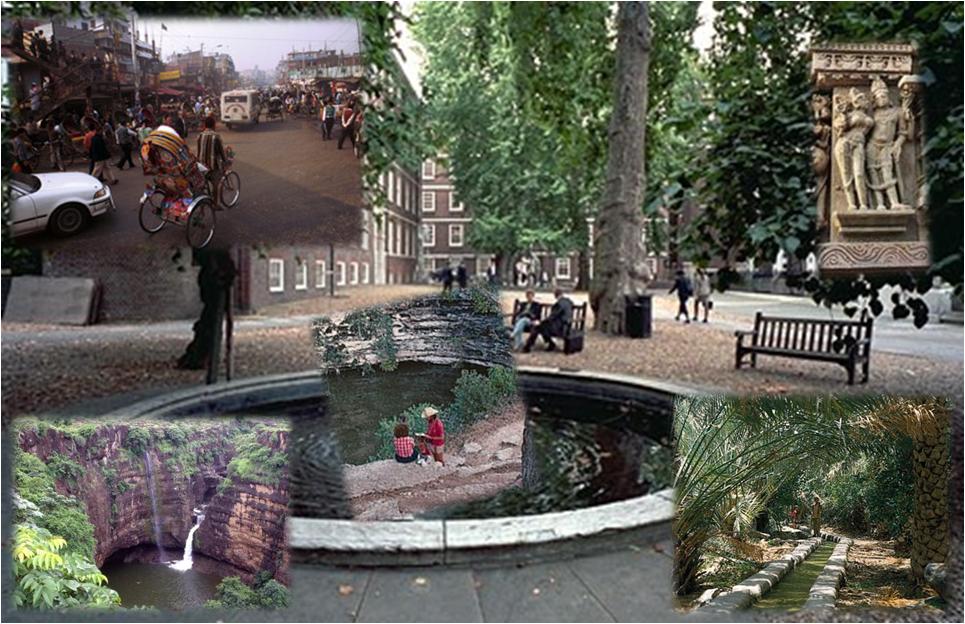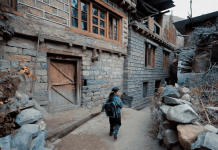Lata risked her life. It was around eleven pm. The sole-telephone of the working-women’s-hostel, in which she lived, was out-of-order. Signboards of black bold letters, ‘STD-PCO’ on yellow background were still seen in many nook and crannies of the streets and lanes in those days. Mobile-handsets were with selected mortals only, still a gizmo, then, I mean. These handy gadgets were yet to become, an all-pervading accessory for every human-kind then, irrespective of age, income, caste & creed as it is today.
There was widespread panic of communal-riot, everywhere in-and-around the city of Malabar. Some also preferred to call Keralaputra since the time of historical Cera dynasty. Lata was too worried for her parents, particularly her ailing mother. She wanted to ask one of her distant-relatives named Sameer, a shopkeeper, in her village Lilapuram, about the well-being of her papa, mummy and her two brothers. Hardly fifty meters away there was a booth but the old Rajput chowkidar, whom she called Kaka, informed that the same booth was closed then.
“All shops on this street are closed, my child” the old Rajput chowkidar-cum-security of the hostel apprised her of the sensitive situation in his baritone voice.
“Almost a week passed, I’ve no news of my parents and my two younger brothers, Kaka. I must go to auntie’s house for a telephone call.” Lata tried to convince him.
Just a stone’s throw from her hostel, there lived her amiable auntie, on the very next street. In their house they had a landline connection. Lata would come frequently to that house. She used to tutor aunt’s two grandchildren. She was truly affectionate to Lata.
The night was eerily silent. There wasn’t a soul on the street. As she was about to start walking on the deserted narrow-street, the gatekeeper warned her once again. She too knew the risk. But she was desperate to do that, I mean venturing out in such circumstances, because she was worrying about her hapless old parents, both illiterate peasants. Her two little brothers, Ankur and Akshay were not grown up enough to take care of them.
“Hello, Hello, Sameer, It’s me, Lata from Malabar” Lata spoke worryingly. All through the time, as she was talking, auntie kept on looking at her. Auntie enquired, as she put down the receiver, “How are they? Where are they living now? Lata was told that all of them took a shelter along with many other villagers in a relief-camp, only some men-folk were there in the village premises. During night they would rest in the nearby fields and keep a vigilant eye. Gangs of violent-mob belonging to both the communities attack any time. No one knew about the plan and the executions of either. Many houses were burnt in a neighbouring village. Tears rolled down her cheeks. Her papa conveyed that she should remain in her hostel. Patting on her shoulders and wiping the tears by the end of her scarf, auntie assured her, “They will always remain with all other villagers and the Almighty shall take care of them. Have faith in Him. And you are not alone here my daughter, if you like, you can stay in our house, along with my children.
That night the old-lady didn’t allow Lata to return to her hostel alone. She instructed one of her sons to accompany her right up to the main-gate of her hostel and talk to the chowkidar before returning.
Next morning one of her inmates informed that someone was waiting for her at the basement near the main-gate. She descended the stairs bit quickly. Upon reaching there she found Meghji, who was one of her colleagues, a very good friend of her, was talking to the chowkidar-kaka. She had the intuition. Meghji wasn’t just another friend. Since her childhood never in her life Lata literally had a good boy-friend except him. He was quiet, gentle and soft spoken. Meghji would always admire her self-esteem, determination and tenacity. He noticed the anxiety on her pallid face. There was no formal ‘Hi’ or ‘good morning’. He straightway asked about her parents and other family members. He was talking feelingly. She told him, how panicky the situation out there in her village was. Lata revealed her intense desire to meet her parents.
Meghji and Lata didn’t mean to fall in love. But since ages, as people say, ‘love happens when you least expect it’. It creeps up suddenly when someone needs attention, care, conversation, laughter and maybe even subtle-intimacy. Love doesn’t look at logic, or at backgrounds and least of all, even castes & creeds.
Lata was from a very conservative family that went to a temple every auspicious day. Meghji would come to market to buy goods for every celebration in his family. That said it all. Their paths would never have crossed if it hadn’t been for that fateful day, the day when he walked into the coffee shop. Lata wondered if destiny chose our loved ones for us. Did we have any role to play at all? She looked at her watch. Meghji was late. They met every Thursday at five pm to catch up. Their conversation lasted for hours, sometimes at the cafe, sometimes while enjoying a ride on his motorcycle, sometimes in places that she could never tell her friends about. They would never understand. And yet Meghji made her happy.
Meghji managed to book a flat on the outskirts, on loan of course, barely after three years of his job. That was indeed a pragmatic decision Lata felt. Albeit, he had to hand over a hefty sum as EMI every month but that was worth considering the future. For every bit of interior furnishings he would consult Lata.
‘There is no end to these decorations’ Lata would comment judgmentally. “Yes, I know” Meghji would endorse diligently.
Suddenly, one afternoon, Lata was informed that Meghji had sent a message. The bearer of the envelope, a common friend of Meghji and chowkidar Kaka, lived nearby. “I’m on my way. Have something important to tell you.” Lata stared at it, the syntax, which contained that unique sequence of alphabets. She knew nothing about those. She had no clues. And thus, as usual in such situations as it usually happens, she’d knots in her stomach. Thoughts flooded her mind. What did he want to tell her? Did he enquire about her family members? Are they all safe?
Meghji would respect her strong will-power & self-confidence but at that juncture he apprised her of the situation, convinced her that it would be certainly a rash-decision to move out and travel up to that village amidst all those communal disturbances round the city. There was violence everywhere. He apprised Lata of an incident in which a poor fruit-vendor was burnt alive when he was caught in a sudden erupt of communal-strife. The violent mob didn’t spare even a policeman. The constable was severely beaten up till death and his rifle was snatched.
They were engrossed in their conversation. Many silent minutes passed.
Lata looked at Meghji. A few speechless seconds passed. Meghji hailed from, Jhakharsan, a prosperous peasants’ village, about fifty kilometers away from her village Lilapuram. She was hesitating to request Meghji to accompany her but within she strongly felt the urge to meet her parents. She was in a dilemma. Instead, calmly she asked Meghji when he was planning to visit his village.
“I’m not planning now” he replied quietly. Before leaving he advised her not to venture out alone. And he noted down the telephone number of Sameer. He promised her that he would keep in touch and very soon would find a way out.
Two more days passed. The front pages of all newspapers reported fresh-incidents of communal-strive from different places. Meghji would telephone and talk to Sameer frequently and convey those messages to her. Sameer wasn’t aware of the relation between Lata and Meghji albeit he could presume out of those telephone calls that Meghji was truly concerned for Lata and her family. Meghji’s concerns irritated him. Neither Sameer was equally educated as Lata nor did she ever have a friendly-relation. Nevertheless, he couldn’t stand the thought that one day she might prefer to marry that boy.
Normally Sameer never telephoned Lata. One evening she was informed by one of her inmates that someone named Sameer telephoned and wanted to talk to her. And she was told to convey Lata that her parents were safe. Sameer’s parents were also with them. Lata reminisced her childhood days, collage-of-scenes flashed in her mind. Sameer’s father, Abhay-uncle, a distant-cousin of Lata’s father, was unquestionably well-built both physically as well as mentally. All the children were very much scared of his commanding voice and his piercing eyes. On the other hand he was a staunch conservative. Like a few other seniors, he too wasn’t in favour of Lata’s college-education. It was her mummy who supported the most.
Few more days passed. Sameer and two of his cousins planned to call Lata. Somehow they wanted her in the village. Sameer intended to marry her. He pleaded his mother to convince Lata’s parents. They knew. The poor & illiterate couple could be easily beguiled and finally convinced. Sameer’s family extended all the necessary help to that hapless poor couple and their two sons. Sameer’s mother and a few other seniors too were involved in that upcoming engagement-ceremony while Sameer’s father wasn’t aware of that. They kept it a secret on the pretext of giving him a surprise. Reasons were better known to them, the mother-son-duo.
One evening Meghji received a call from Sameer. He was informed that Lata’s father wasn’t keeping well. His condition was too serious. At first Meghji thought not to disclose the disturbing news instantly. But the very next day Sameer informed the same to her hostel warden too. Thank God, he had already requested the warden in the previous day not to tell Lata any such news that would make her more worried as she was already panic-stricken. The lady kept her words. In the evening Meghji casually rang in the hostel. The warden conveyed him the same news. He took out his bike. Within a few minutes he was on the street and then the Market road. Almost all shops were closed except few small shops and cabins. There were very few people and vehicles seen around. The elite surroundings wore an uneasy desolate look. And the river Subarnamani was witnessing yet another worse communal-violence. She would certainly shriek with pain if she could. She was grief stricken. With her dry and devastated bosom she wasn’t able to shed her tears even.
While crossing the Elphinstin-bridge he saw the charred remains of the cluster of huts right below the bridge, the mute testimony of the insane actions against humanity. As he entered the old-city area through the main road, he noticed patrolling cops and their vehicles about a few hundred meters ahead. He knew that they would stop him. Immediately he took a turn and entered in a branch-lane. Those were narrow lanes. Somehow he reached the very street, which led to the locality where the hostel was. No sooner his bike came out of a narrow lane than a crude bomb, was thrown towards him. However, that missed the target and exploded near the junction of lanes very close to him. Never in his life had he had such a close encounter with a bomb explosion. He felt a shiver right through his spine.
He stopped his bike only in front of the hostel main-gate. A tiny hot object hit at the side of his right knee. The thick fabric of his trouser shielded to some extent. He felt the hit but ignored at that moment. Seeing him chowkidar kaka came forward. He apprised Meghji of a commotion right on the next street a few moments earlier. Kaka advised him to keep the bike inside the basement. And it was him who first noticed the blood stain near the knee. Except that little injury he escaped almost unscathed. Nevertheless the said experience made an indelible mark on his mind. He met the warden. Lata was called from her room. They conveyed the news to her. She was shocked. Hardly the poor soul could speak but looked at them with wet eyes. Meghji consoled her and apprised her that he would take her to the village by any means. He needed some first-aid. One of the residents, a paramedic, provided the needful help. And it was decided that the next morning as early as possible Lata would reach the bus-terminus by an auto-rickshaw. Meghji would pick her up from there to avoid people’s unholy attention. They were not sure. Some-people might have followed Meghji. There was an extra room in the basement of the hostel-building for urgent need. That room was arranged for Meghji to spend the night.
It was a totally sleepless night for Lata. She gave complete attention to practically every bit of sound coming from unknown sources of utter-darkness. Police vehicles passed by. They blew whistle. Bats flattered. A baby cried. And dogs barked all over the night.
Next morning she reached the bus-terminus. Meghji was waiting beside the entrance. Donning a simple cotton salwar-kameez-suit, looking more lean and petite, Lata alighted quietly out of the auto-rickshaw. Her pallid face appeared emaciated owing to the tension and sleeplessness she had all through the last night. On seeing Meghji, leaning against his bike, she smiled discreetly with poised reservedness. Her sparkling teeth-line appeared for a split-second. Eyes seemed too tired. Dark circles were faintly though but very much visible. Slowly she came and sat on the pillion. He knew her quiet movements. Before they could move out of the city limits they were stopped by the police.
He didn’t notice the patrolling cops else he would enter in some other lane. They stopped him. One of them asked, “Where are you heading man? What’s your name?”
“I’m going to my native village, my name is Meghji Nayani,” he replied calmly.
“And who’s this Mrig-Nayani?” a lady constable shot this question sarcastically.
Meghji said with his signature tranquility and quietness, “She is my wife.”
They didn’t probe further and let the duo move. Meghji stately sat on his bike, Lata followed the pillion seat at the back and then he moved the key to start his bike. As they were about to move slowly Lata could overheard quite clearly the taunting words of a cop standing near a paan shop, “who knows the pair may be absconding lovebirds.” She felt the utterance of the words, ‘absconding lovebirds’ were indeed boorish. She was badly hurt. But incidentally at that instant she recalled an article, she read some days back, which befittingly stated that the greatest effort to ward off all evil is the battle with one’s own self, i.e. one’s own soul, to fight the evil within oneself.
Meghji projected Lata as his wife for he had no better options left to satisfy the subtle quarries and their prying eyes. On the way they halted in a motel. There was STD facility. Lata wanted to talk to Sameer. They rang him up. He wasn’t present at the booth. Sameer’s father, Lata’s Abhay-uncle, was on the line. Normally she would hesitate to talk to him. However, the then state of her mind removed all hesitations and she literally broke the ice. She enquired about her papa and mummy. But to her utter dismay, she was told that her father was alright. He had had no health problems. Both her papa and mummy were keeping well.
Meghji and Lata, both, were totally confused. They went inside the restaurant, thinking and barely understanding the intention of Sameer, without being able to guess what he was going to do.
Looking at the steaming hot cup of tea Lata kept pensively quiet. While sipping tea they started talking a few mundane matters. They felt that definitely there was some intention but both of them were dazed at that point of time. After awhile, having some quiet thinking, Lata planned to visit the village, where lived a sister of her papa. Both decided to pay a surprise visit to that village and meet her aunt. Lata visited the place last time a couple of years back. It wasn’t too far from that road point on the highway.
On reaching there they found that no one was at home. Few neighbours informed them that her two sons were in the farm. Others, out of fear, left the village, for the time being. They’d to wait there. Someone was told to call her sons. And thereafter, the eldest one was requested to accompany Lata to her village. They hired a cab. On the way they witnessed some ravages of communal strife. Burnt houses and haystacks stood as mute testimony of mob frenzy. Finally Lata met her parents. Reaching there, she came to know that her parents, burdened under the pressure of the financial aids, which they received from time to time from the parents of Sameer. Lata’s parents were in embarrassed circumstances, because Sameer’s parents were rich, accepted their proposal. They were convinced and consented to give their daughter, Lata, to Sameer. Her poor parents had to agree else they were left with the only option of parting with a part of their arable land to clear all the debts. But, they knew, considering the future such course of action was painful to agree upon.
Meghji in his home, oblivious to all the then developments, received a message from Lata. And it was very much like a bolt from the blue for him. He pondered over the text and understood that a briefing was indeed indispensible at that point of time. He took out his bike and met her.
After a few days, Lata returned Malabar from her Aunt’s village. Meghji arranged the worrisome big-sum, which was transferred to her bank account. Her parents’ debts were cleared.
“How did you manage such a big-sum within such a short span? She enquired. With his childlike smile round his lips he said, “Let’s not worry about anything. Tell me, aren’t you happy that your parents are freed now from the burden of debts?”
She returned Malabar along with her parents and her two younger brothers. She wasn’t residing in that hostel in the old-city-area any more. They were living in a rented-house far from the din and bustle of the city, the new or the old. It was an unfamiliar housing-society on the outskirts by the Surangam-Gandhialayam highway.
Meghji and Lata could move freely around because they were complete strangers for the people living out there in that locality. While enjoying coffee, one evening Lata was proudly showing Meghji all her collections of tapestries, designer articles of home-decor and crockery.
While folding and stacking the tapestries to put those back in the selves suddenly she recollected about the flat on the outskirts of the city. “Let’s visit the flat, I haven’t been there for quite some time” suggested Lata. By the way, Oh, I forgot to show you, see this beautiful latchkey I bought for our new house.
Meghji with his signature smile around his Adonis lips simply looked at her for a few seconds, softly bated his eyelids and said, “It’s sold, I mean that flat, but don’t you worry, we’ll buy once again, you know.”
*******
















